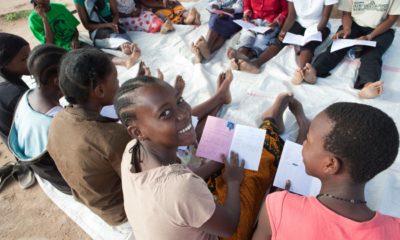
With more than half the global population aged under 30, issues affecting young people are receiving greater attention from policymakers. Tackling high youth unemployment and low school attendance rates, and providing greater access to sexual and reproductive health services, are now top priorities. Leaders are beginning to realise that responding to young people’s needs is the only way to meet the biggest challenges facing the world.
But how involved are young people in the decisions that affect them? We asked campaigners involved with the youth-led NGO Restless Development what needs to be done to bring them closer to the heart of development.
Offer us a seat at the table
Though there are more young people than ever in the world, youth campaigners remain underrepresented in global decision-making. “We feel that local and national leaders don’t hear us,” says Joseph Buyaga, president of Tanzanian NGO Youth Vision Sound. “This comes from negative cultural perceptions of young people in society – they don’t always value our contributions at village meetings, for example.”
Campaigner Amro Hussain, 25, agrees. “I think the main issue facing young people is underrepresentation in the institutions that govern their lives, as this negatively impacts every other issue affecting young people,” he says.
Don’t make us your tokens
Once there are more young people included in policy talks, what next? “Commit to it,” says Hussain. “Young people need to be offered a genuine opportunity to change the narrative that they are apathetic or incapable, but this requires both meaningful inclusion and time.”
Ronagh Craddock, a youth delegate at the UN summit for sustainable development, says involving young people from the start is the most effective way to ensure their views are included. “One of the main challenges, I find, is that young people are often involved by government and development organisations at a late stage – to deliver development messages and enthuse the public – but we need to be involved from the beginning.”
Ani Hao, a 24-year-old researcher based in Rio de Janeiro for the youth-led project Case for Space, agrees that young people are too often “add-ons” to existing forums or policies: “There has been significant tokenism and a lack of real space for young people to truly influence agendas and gain power and autonomy. Still, there is now more awareness and conversation about this.”
Fund youth-led, grassroots projects
The antidote to tokenism, Hao argues, is meeting young people where they are – and that means venturing outside the formal NGO sector. “Many youth-led civil society organisations around the world, especially in the global south, are informal – that is to say, unregistered – and there are a variety of reasons for this,” Hao says. “Many governments actively monitor and crack down on registered civil society organisations, knowing that these organisations represent movements and voices that criticise government activities and often corruption. Other youth activists simply prefer to remain independent and not become ‘NGO-ised’, or, in their eyes, increasingly divorced from grassroots activism and the real movements. These youth-led movements simply do not get the attention that they deserve from their own societies, let alone the world. They are starved for funding, capacity-building and networks.”
Collect data on the issues that affect us
To engage effectively with young people, leaders have to know the issues that affect them most, says Buyaga. He recommends governments recruit young people to collect information in order to fill data gaps about under-30s, helping to inform national development plans in the process. “We can collect and analyse the data that is missing on young people, and share this with the big decision-makers,” he says.
Buyaga says this is particularly important in countries with hard-to-reach communities, or where young people feel marginalised and misunderstood by their leaders. “Young people in Tanzania face various issues like youth unemployment, poor education systems, lack of livelihood or entrepreneurial skills, lack of capital. If given a chance, the young campaigners can improve this. We can provide a voice to government to inform policies that enable young people in Tanzania to participate effectively in the economy.”
Teach us what you know
If young people don’t know their rights, they can’t improve their futures, says Prince Mthandazo Khumalo, 29, from Zimbabwe. “Many young people are still [languishing] in excruciating poverty without job prospects. They still lack the platform to exercise their rights and without that they lack prospects for change.”
Young people are keen to learn how to campaign on their own behalf, says campaigner Hussain. “States and development organisations need to target the factors that limit youth involvement. They need to empower youth through education, training and the creation of networks. Lots of young people are increasingly involved in development and social change but most are still held at arm’s length, either left in the dark about their roles as agents of change or limited in those roles due to lack of support.”
Primrose Manyalo, global campaigns coordinator for Restless Development’s Youth Power movement, says the perception of young people as leaders is improving, and was evident in recent consultations for the sustainable development goals.
“In the spirit of leaving no one behind,” she says, “there were increased efforts by the UN, governments and civil society to increase young people’s participation in the SDG formulation process compared to the millennium development goals that came before them. Working directly with young people at grassroots, national, regional and global level, I have witnessed how, when young people are given enough capacity, support and trust, they are an unstoppable force for positive change.”
END

Be the first to comment